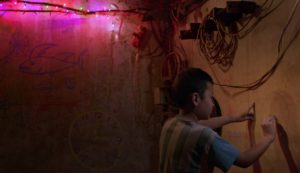 Attend: One Night Only
Attend: One Night Only
Kaili Blues | Bi Gan | China | 2015 | 113 minutes
Spotlight Cinema, Madison Museum of Contemporary Art, Wednesday, October 12, 7:00pm»
Grant Phipps explores Bi Gan’s dream-like meditation, Kaili Blues, and savors its mysteries and complexities.
Twenty-six-year-old phenom Bi Gan’s challenging but invigorating feature debut can feel like a cluster of impenetrable, encrypted data; but its significance is more cogent when dissected into its vignettes, poetic voiceovers and embedded cassette recordings. The yearning in Kaili Blues may often defy linear explanation, but Bi rewards the attuned ear and eye with his uncompromising impressionistic detective fantasy.
As the writer-director’s dense poetry mystifies and personifies the air, his elliptical trip through memory is simultaneously a real-time familial investigation across the diverse landscapes of China’s subtropical Guizhou province. Ex-convict and medical practitioner Chen Sheng (Yongzhong Chen) has his life upended (again) by the disappearance of young nephew Weiwei (Feiyang Luo), who’s been sold to pay the debts of his half-brother Crazy Face (Lixun Xie). In order to find him, Chen sets off for Zhenyuan by train, one of the many that link not only location but the dreamlike sense of time, oscillating between its inevitable progression and magical realist revisionism.
If Bi has loosely borrowed a sensibility from Arkady and Boris Strugatsky’s Roadside Picnic sci-fi novel, which is this film’s literal title translation (路边野餐 [Lù biān yěcān]), it seems more than serendipitous that Kaili Blues would spiritually conjure Andrei Tarkovsky’s Stalker (1979), which shares the same source text. But Bi splices the Russian director’s shape-shifting mysticism with the kind of roaming existential pontificating found in Richard Linklater’s Slacker (1991). And as with Tarkovsky and Linklater’s musings, Bi’s fascination with the intersection of culture, art, and cinema is lovingly demonstrated in the synchronicity of lyrical voice and deliberate camera movement.
Perhaps this explains the stream-of-consciousness style that obfuscates direction. Kaili Blues is inherently nomadic; its search for metaphysical meaning complements its physical journey from the darkest den to the undulations of the river and road beyond the horizon. Intertwining with the deconstructed narrative is an unshakable anxiousness of infinite possibilities, which lends viewers the feeling of celestial levitation in observance of the convergence of multiple realities in the latter half.
Wang Tianxing’s emotionally charged cinematography, whether in long shots of interior and exterior landscapes, lingers on the grand picture of community identities caught in the permeable stream of time. Slow pans of Kaili’s rundown urban architecture in its first half cut to a singularly immersive centerpiece—a forty-minute tracking shot weaving through the alleyways and canals of Dangmai.
An extended quote from the Zen Buddhist Diamond Sutra prefaces Bi’s overarching idea that grasps at the mind’s perception of time in past, present, and future. In Kaili Blues‘ circuitous wandering, souls ascend their bodies; the impossible is deemed permissible; the abstract interacts with the tangible. “Memories pushed into the veins of my hands by a torch sifting light through my palm…”
A shadow on Weiwei’s chalk-drawn wall clock (literally) foreshadows the gift of a wristwatch and family profession of horology; the phantom of a future train seamlessly speeds through brick; Dangmai’s hairdresser revives the spitting image of Chen’s deceased wife Zhang Xi (Linyan Liu); a young tailor and aspiring tour guide, Yangyang (Yue Guo), meticulously recites Kaili’s geography and climate in a statistical mantra that provokes an inexplicably older Weiwei to transport his uncle Chen through time and then reverse it by the familiar act of drawing clock faces on a train- if only his moped allows him to catch it.
Bi has specifically noted the inspiration of Hou Hsiao-hsien’s Goodbye South, Goodbye (1996) but the film he’s made seems to reference it only in terms of gang-focused backstory and the periphery of Chen’s life that exists beyond the frame and time that the director and his proxies manipulate. Rather, the final musical meditations on the Miao people, whether through rock band or traditional lusheng pipe-players, and emphasis on transformative reunion, vividly compare to the mood and social commentary of Thai director Apichatpong Weerasethakul. As with his predecessors, Bi’s unorthodox and original storytelling in Kaili Blues is commendable in a medium whose eternal questions are too often laid bare.
Editor’s note: Special thanks to Grant Phipps for his contribution on Kaili Blues, a unique film that we wanted to be sure to discuss here at the Madison Film Forum. You can also read my review of the film in the current Isthmus. We all hope that the sole screening is well attended on Wednesday.—James Kreul